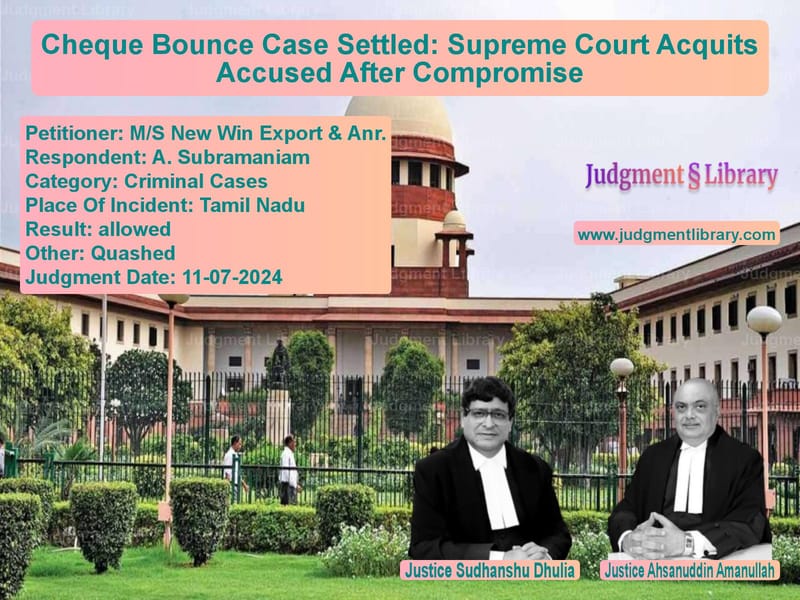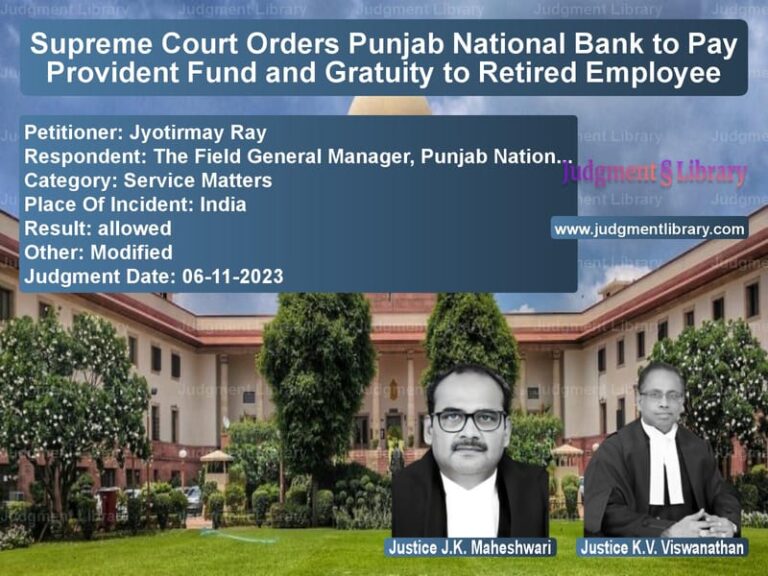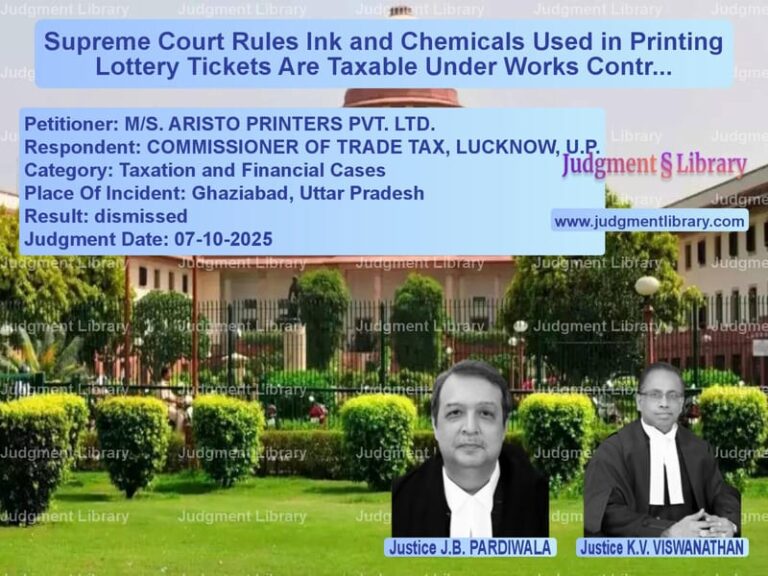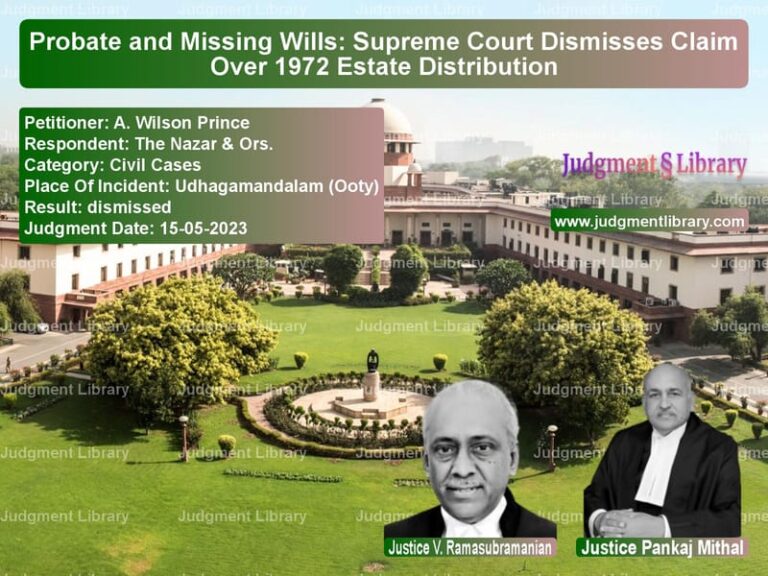Cheque Bounce Case Settled: Supreme Court Acquits Accused After Compromise
The case of M/S New Win Export & Anr. vs. A. Subramaniam revolves around a cheque bounce dispute under Section 138 of the Negotiable Instruments Act, 1881. The Supreme Court of India set aside the conviction of the accused after the parties reached a financial settlement, reinforcing the principle that such offences are primarily compensatory in nature rather than punitive.
Background of the Case
The dispute dates back to 2006 when the respondent, A. Subramaniam, extended a loan of Rs.5,25,000 to appellant No.2. In an attempt to discharge the debt, the appellant issued a cheque in favor of the respondent in the name of his partnership firm, M/S New Win Export. However, the cheque was dishonored due to ‘insufficient funds.’ This led the respondent to file a complaint under Section 138 of the NI Act.
The Trial Court, in its judgment dated October 16, 2012, convicted both appellants and sentenced them to one year of simple imprisonment. The Appellate Court, however, reversed this finding and acquitted them. The respondent then challenged the acquittal before the High Court, which reinstated the conviction on April 1, 2019. Aggrieved by this, the appellants approached the Supreme Court.
Settlement Agreement Between the Parties
Before the Supreme Court could hear the appeal, the parties reached a settlement agreement on January 27, 2024. The key terms of the settlement were:
- The appellants paid Rs.5,25,000 to the respondent as full and final settlement.
- The respondent agreed not to object to setting aside the conviction.
- The respondent acknowledged receipt of the amount and expressed no further grievance.
The relevant portion of the settlement agreement states:
“The First Party and the Second Party had agreed to settle their dispute at a final settlement of Rs.5,25,000/- (Five Lakhs and twenty-five thousand only) and the First Party had received the said amount through a demand draft. The First Party agrees to accept the final settlement amount and shall have no objection if the conviction of the Second Party is set aside by the Hon’ble Supreme Court of India.”
Supreme Court’s Observations
The Supreme Court emphasized the compounding nature of offences under the NI Act. Section 147 of the NI Act allows all offences under the Act to be compounded, meaning they can be settled between the parties at any stage. The Court also referred to Section 320(5) of the Code of Criminal Procedure (CrPC), which mandates that compounding after conviction requires the court’s approval.
To ensure the authenticity of the settlement, the Supreme Court, in its order dated March 18, 2024, directed the respondent to submit an affidavit confirming that the settlement was voluntary. The respondent complied and filed an affidavit on March 27, 2024, supporting the appellant’s case. The affidavit clearly stated that the respondent had no objection to the appellants’ acquittal.
Read also: https://judgmentlibrary.com/supreme-court-acquits-man-due-to-procedural-lapses-in-murder-conviction/
Key Judicial Precedents Considered
The Supreme Court referred to several landmark judgments that encourage compounding in cheque bounce cases:
- Damodar S. Prabhu v. Sayed Babalal H. (2010) – Courts should encourage settlements in NI Act cases to reduce litigation.
- Gimpex Private Limited v. Manoj Goel (2022) – Compounding should be prioritized over punishment in cheque dishonor cases.
- Meters and Instruments Private Limited v. Kanchan Mehta (2018) – Emphasized the compensatory aspect over the punitive aspect in NI Act cases.
Final Verdict
The Supreme Court, after verifying the settlement and considering the precedents, ruled:
“The conviction of the appellants would not serve any purpose in light of the settlement. We, therefore, set aside the conviction and allow the appeal.”
The Court quashed the High Court’s order dated April 1, 2019, and restored the acquittal granted by the Appellate Court. It also discharged the sureties and exempted the second appellant from surrendering.
Implications of the Judgment
This ruling has significant implications for cheque bounce cases:
- Encouragement of Settlements: Courts will uphold settlements in NI Act cases, reducing unnecessary imprisonment.
- Judicial Efficiency: Encouraging compounding helps clear a large backlog of cheque bounce cases.
- Protection of Commercial Interests: The ruling reinforces that the primary objective of the NI Act is to secure payments rather than punish offenders.
Conclusion
The Supreme Court’s decision in this case reinforces the principle that cheque dishonor offences should be resolved through compensation rather than imprisonment. This judgment will serve as an important precedent in promoting out-of-court settlements in similar cases.
Petitioner Name: M/S New Win Export & Anr..Respondent Name: A. Subramaniam.Judgment By: Justice Sudhanshu Dhulia, Justice Ahsanuddin Amanullah.Place Of Incident: Tamil Nadu.Judgment Date: 11-07-2024.
Don’t miss out on the full details! Download the complete judgment in PDF format below and gain valuable insights instantly!
Download Judgment: ms-new-win-export-&-vs-a.-subramaniam-supreme-court-of-india-judgment-dated-11-07-2024.pdf
Directly Download Judgment: Directly download this Judgment
See all petitions in Cheque Dishonour Cases
See all petitions in Dispute Resolution Mechanisms
See all petitions in Commercial Arbitration
See all petitions in Settlement Agreements
See all petitions in Fraud and Forgery
See all petitions in Judgment by Sudhanshu Dhulia
See all petitions in Judgment by Ahsanuddin Amanullah
See all petitions in allowed
See all petitions in Quashed
See all petitions in supreme court of India judgments July 2024
See all petitions in 2024 judgments
See all posts in Criminal Cases Category
See all allowed petitions in Criminal Cases Category
See all Dismissed petitions in Criminal Cases Category
See all partially allowed petitions in Criminal Cases Category







